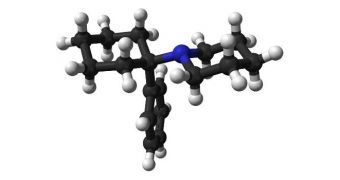A team of experts with the Department of Biochemistry and Molecular Biology at the University of Southern Denmark (USD) recently conducted an investigation on the brains of lab rats that were administered the strong hallucinogenic drug phenocyclidine (PCP) and were able to identify a series of proteins that may act as physiological markers of schizophrenia.
Animal models such as lab rats are often used as proxies to study the type of brain activity that accompanies schizophrenia in humans, since doing so on people is a very complex, and often useless, process. The rodents are administered PCP, also known on the streets as angel dust, because this recreational dissociative drug produces symptoms akin to schizophrenia.
The goal for such investigations is to identify and study protein makeup and distribution across the schizophrenic brain, as compared to the healthy brain. Scientists say that such comparisons could lead to the development of more effective medication that do not carry the side-effects associated with existing drugs. The rat brain seems schizophrenic when the rodents are administered PCP.
Among the most common symptoms, researchers include changes in movement patterns, as well as impaired memory, reduced attention, and a severely diminished learning ability. These reduced cognitive functions are a hallmark of schizophrenia in humans, and the new paper appears to indicate that numerous proteins may play a role in the development of this condition, PsychCentral reports.
During the new experiments, USD researchers were able to identify no less than 352 proteins that appeared to play a role in the modified behavior and cognitive abilities of rats. This relatively high number of molecules suggests that indeed neuroscientists are right in assuming that no single molecular or genetic cause exists for this disease; rather, it is a product of numerous changes working together.
“When we give PCP to rats, the rats become valuable study objects for schizophrenia researchers. Scientists have studied PCP rats for decades, but until now no one really knew what was going on in the rat brains at the molecular level. We now present what we believe to be the largest proteomics data set to date,” says professor Dr. Ole Nørregaard Jensen, the head of the DBMB.
Since PCP does not linger in the rat brain for very long, the team had to be quick to analyze the rodents' brains as soon as possible. The experts say that it took just 15 minutes for the drug to take effect. After just 240 minutes, most of that effect was gone, so the group had a narrow window of opportunity.
“We found 2604 proteins, and in 352 of them, we saw changes that can be associated with the PCP injections. These 352 proteins will be extremely interesting to study in closer detail to see if they also alter in people with schizophrenia – and if that’s the case, it will of course be interesting to try to develop a drug that can prevent the protein changes that lead to schizophrenia,” Jensen concludes.

 14 DAY TRIAL //
14 DAY TRIAL //